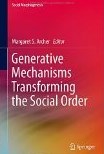News
New publication from Professor Wing Chan
The Department of Sociology are delighted to announce that Professor Wing Chan and Professor John Ermisch have had an article pulished in Population Studies. The article entitled 'Residential proximity of parents and their adult offspring in the United Kingdom, 2009–10' can be found in Population Studies, 2015, Vol. 69, No. 3, 355–372.
Body and Society Special Issue - ‘Estranged Bodies: Shifting Paradigms and the Biomedical Imaginary’
The Department of Sociology is pleased to announce that Professor Deborah Lynn Steinberg has guest edited a special issue of Body and Society 2015 ‘Estranged Bodies: Shifting Paradigms and the Biomedical Imaginary’ http://bod.sagepub.com/content/21/3.toc and that this has just been published.
The Relational Subject
It is with great pleasure that the Department of Sociology can announce that Professor Margaret S. Archer has published a new book with Professor Pierpaolo Donati on 'The Relational Subject'.
Generative Mechanisms Transforming The Social Order
 This new book
This new book edited by Margaret Archer and collecting the work of the Centre for Social Ontology’s collaborators has just been released. It is the latest volume in the Social Morphogenesis series
edited by Margaret Archer and collecting the work of the Centre for Social Ontology’s collaborators has just been released. It is the latest volume in the Social Morphogenesis series and examines how generative mechanisms emerge in the social order and their consequences. It does so in the light of finding answers to the general question posed in this book series: Will Late Modernity be replaced by a social formation that could be called Morphogenic Society?
and examines how generative mechanisms emerge in the social order and their consequences. It does so in the light of finding answers to the general question posed in this book series: Will Late Modernity be replaced by a social formation that could be called Morphogenic Society?
This volume clarifies what a ‘generative mechanism’ is, to achieve a better understanding of their social origins, and to delineate in what way such mechanisms exert effects within a current social formation, either stabilizing it or leading to changes potentially replacing it . The book explores questions about conjuncture, convergence and countervailing effects of morphogenetic mechanisms in order to assess their impact. Simultaneously, it looks at how products of positive feedback intertwine with the results of (morphostatic) negative feedback. This process also requires clarification, especially about the conditions under which morphostasis prevails over morphogenesis and vice versa. It raises the issue as to whether their co-existence can be other than short-lived.
The volume addresses whether or not there also is a process of ‘morpho-necrosis’, i.e. the ultimate demise of certain morphostatic mechanisms, such that they cannot ‘recover’. The book concludes that not only are generative mechanisms required to explain associations between variables involved in the replacement of Late Modernity by Morphogenic Society, but they are also robust enough to account for cases and times when such variables show no significant correlations.
Honorary Professor - Professor Beverley Skeggs
